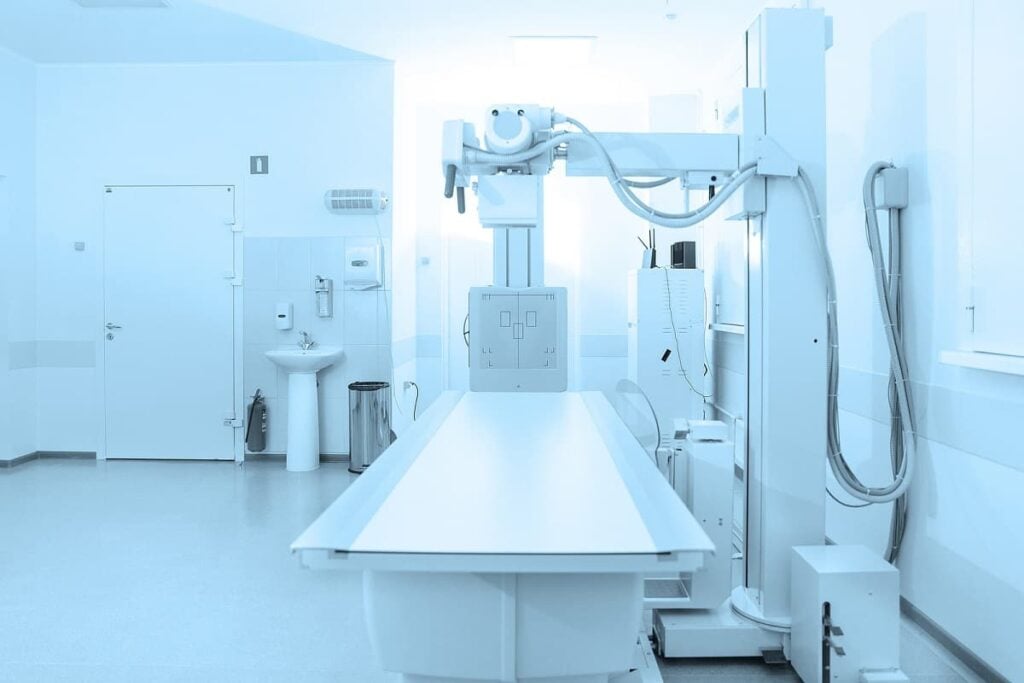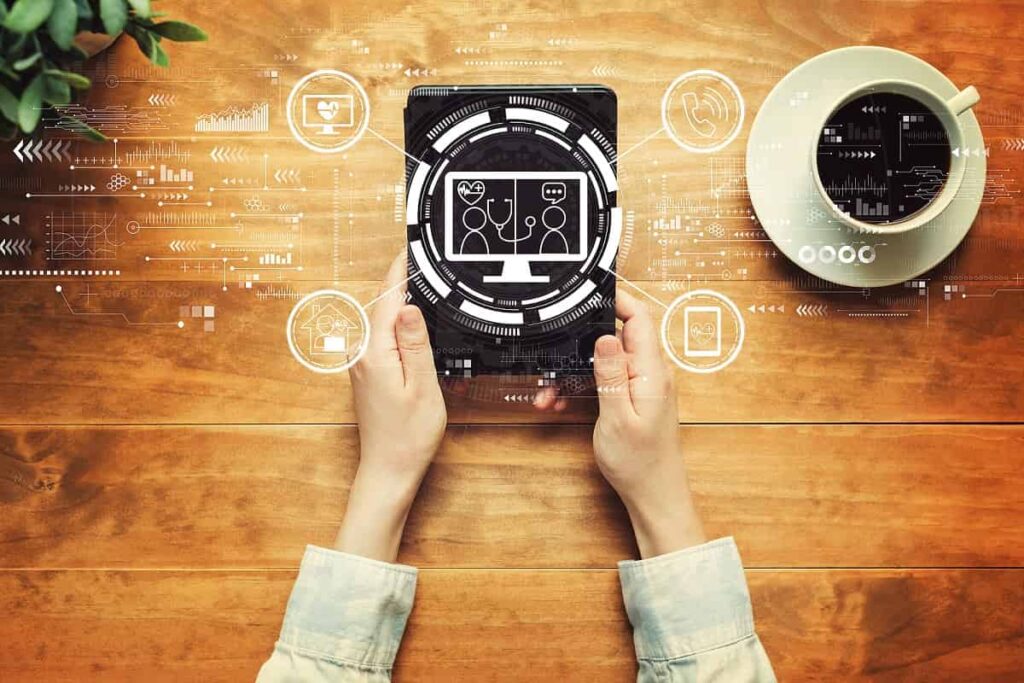6 AI Healthcare Solutions for Remote Patient Monitoring
Table of contents
Table of contents
- Computer Vision for Remote Patient Monitoring in Clinical Trials
- Remote Heart Monitoring Using AI and Sound
- Turning Wearables Data Into Healthcare Action Using AI
- AI-Powered Wearable for Remote Patient Monitoring
- Remote Patient Monitoring for Respiratory Conditions
- Smart Patch for Remote Patient Monitoring
- Conclusion

It’s no secret that big tech companies like Amazon (AMZN), Microsoft (MSFT), and Alphabet (GOOG), the parent company of Google, are investing in digital healthcare. The market opportunity is pretty enticing when you consider that the U.S. alone spent $3.65 trillion on healthcare just last year. Google made the latest headline-grabbing move when it announced that it would buy wearables-maker Fitbit (FIT) in a deal valued at $2.1 billion. Analysts have noted that the acquisition is part of the company’s overall strategy to build an ambient intelligent system where Google is omnipresent. Another motive behind the purchase – pending regulatory approvals – is that Fitbit gives Google access to a treasure trove of healthcare data that it can feed to its London-based AI lab DeepMind or its life sciences subsidiary Verily, which is already collaborating on at least one AI healthcare device for remote patient monitoring.
That project, in partnership with medical device manufacturer iRhythm (IRTC), is looking at ways to improve the collection and analysis of data for patients with atrial fibrillation, an irregular heartbeat that can cause serious health problems. The ultimate goal is to train algorithms that can take the data from iRhythm’s remote monitoring devices in order to predict heart conditions before they even occur. Now think what Google could end up doing with fitness monitoring devices on nearly 30 million people.
While iRhythm may be one of the biggest companies out there today using AI for remote patient monitoring of a medical condition, it isn’t alone. There are plenty of AI healthcare startups raising money to develop hardware or software for various monitoring solutions. The amount of money being poured into these and other AI healthcare companies is simply mind-boggling, based on the latest data from research firm CB Insights:

Below we take a look at 6 AI startups focused on remote patient monitoring platforms that have taken funding within the last year or so.
Computer Vision for Remote Patient Monitoring in Clinical Trials
One of the companies responsible for the big jump in funding to AI healthcare startups in the third quarter is London-based Babylon Health following a $550 million round in August. Its AI chatbot provides health information based on a Q&A with patients. New York-based AiCure has developed a very different mobile AI healthcare assistant in IMA. Founded in 2010, AiCure has raised a total of $51.75 million, including a $24.5 million Series C earlier this month (not to mention another $7 million in grants from the National Institutes of Health). Its platform enables clinicians and researchers to monitor a patient’s treatment progress by measuring changes in facial expression using facial recognition and computer vision algorithms. (At least that sounds more benign than the facial recognition tech from Faception that claims to spot terrorists based on their scowling faces.)

The company, in particular, markets the technology for use in clinical trials to help boost participant engagement and adherence, ensuring that patients are taking medications according to prescribed protocols. A 2017 study, for example, found IMA was 25% better than Nurse Ratched in ensuring schizophrenic patients in a clinical study took their meds.
Remote Heart Monitoring Using AI and Sound


The secret sauce is in the software, which consists of sophisticated algorithms that analyze heart health through a single lead ECG, as well as the heartbeat using a deep neural network model trained on multiple datasets of heart sounds. The sound analysis can pick up the vibration of tissue caused by turbulent blood flow, a murmur that is hard for the human ear to detect because it overlaps with the cardiac beat. Both devices have FDA clearance, while the algorithms are HIPAA-compliant but awaiting regulatory approval.
Update 11/09/2020: Eko has raised $65 million in Series C funding to expand its new telehealth platform and algorithm to more clinics, and launch an at-home monitoring program for cardiopulmonary patients. This brings the company’s total funding to $95.5 million to date.
Turning Wearables Data Into Healthcare Action Using AI

AI-Powered Wearable for Remote Patient Monitoring
Scottish startup Current Health, founded in 2015, has built both the hardware and software to provide real-time insights into a patient’s health using a wearable armband. The company has raised $11.7 million in disclosed funding. Its algorithms continuously analyze a number of vital signs, including pulse rate, oxygen saturation, respiration rate, temperature, and movement, from its own device, but the platform can also capture additional metrics.

Earlier this year, Current received Class II clearance from the FDA for hospital care. Its system is already used in the UK, where healthcare providers use the device to remotely monitor patients after they’ve been discharged from the hospital. The data has enabled health officials to reprioritize who lives and who dies when to conduct home visits, resulting in a 22% drop in home visits, as well as fewer hospital re-admissions and emergency department visits.
Update 04/22/2021: Current Health has raised more than $43 million in Series B funding to support global expansion of their remote care management platform. This brings the company’s total funding to more than $91.9 million to date.
Remote Patient Monitoring for Respiratory Conditions


For example, Feebris is currently running a pilot in India to help healthcare workers diagnose respiratory conditions for 10,000 children in the field. Feebris is also working with 1,000 elderly patients in the UK to develop AI-powered remote monitoring for asthma and related conditions.
Smart Patch for Remote Patient Monitoring

Conclusion
We’ve been writing quite a bit lately about how AI will transform healthcare, especially in the diagnostics arena. Using machine learning and other types of algorithms to monitor patient health remotely is an integral part of diagnostics, so it’s no surprise that most of what these startups are doing is actually trying to detect, diagnose, and prevent disease or illness. Expect to see more startups emerge in this category, especially as the FDA and other regulators show an increasing willingness to approve these devices and algorithms for clinical use.
Sign up to our newsletter to get more of our great research delivered straight to your inbox!
Nanalyze Weekly includes useful insights written by our team of underpaid MBAs, research on new disruptive technology stocks flying under the radar, and summaries of our recent research. Always 100% free.















Remote patient monitoring services often involve IoT-powered smart gadgets or devices that help monitor patient vitals. This is immensely beneficial for seniors in retirement communities or patients living in assisted living institutions. Such people would have difficulty traveling to clinics for consultations. But with RPM-enabled devices, doctors can collect their health information remotely and assess it to find out any medical risks around the corner.
Healthcare analytics form the backbone of preventive medicine. While remote patient monitoring systems collect health data, advanced algorithms assess the same to detect early signs of disease. Such ability enables doctors to prescribe appropriate medication and recommend changes to lifestyles that would be conducive to wellbeing. Such a preventive approach has led many experts to rethink healthcare and advocate for a more proactive approach, rather than a reactive one that only jumps in during hospitalizations.
Makes a lot of sense Shawn!